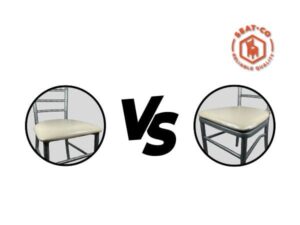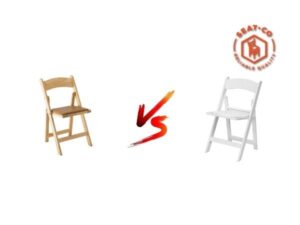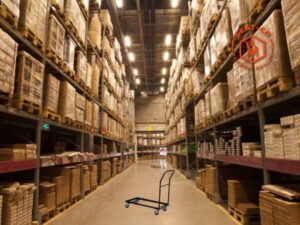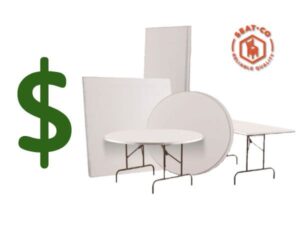Navigate Your Choices with Clarity: Discover the Pros and Cons of Each Material
Written by: Marcelo Flores
Choosing the right Chiavari chairs for your venue or rental business involves selecting a material that aligns with your needs, expectations, and the experiences you want to provide your guests. In this comprehensive guide, we delve into the pros and cons of wood, resin, and metal Chiavari chairs, offering you transparent insights to help you make an informed decision.
Table of Contents
1. Wood Chiavari Chairs: Timeless Elegance Meets Natural Warmth
2. Resin Chiavari Chairs: Durable and Versatile
3. Metal Chiavari Chairs: Strength and Style
4. Making Your Choice: Which Chair Suits Your Needs?
1. Wood Chiavari Chairs: Timeless Elegance Meets Natural Warmth
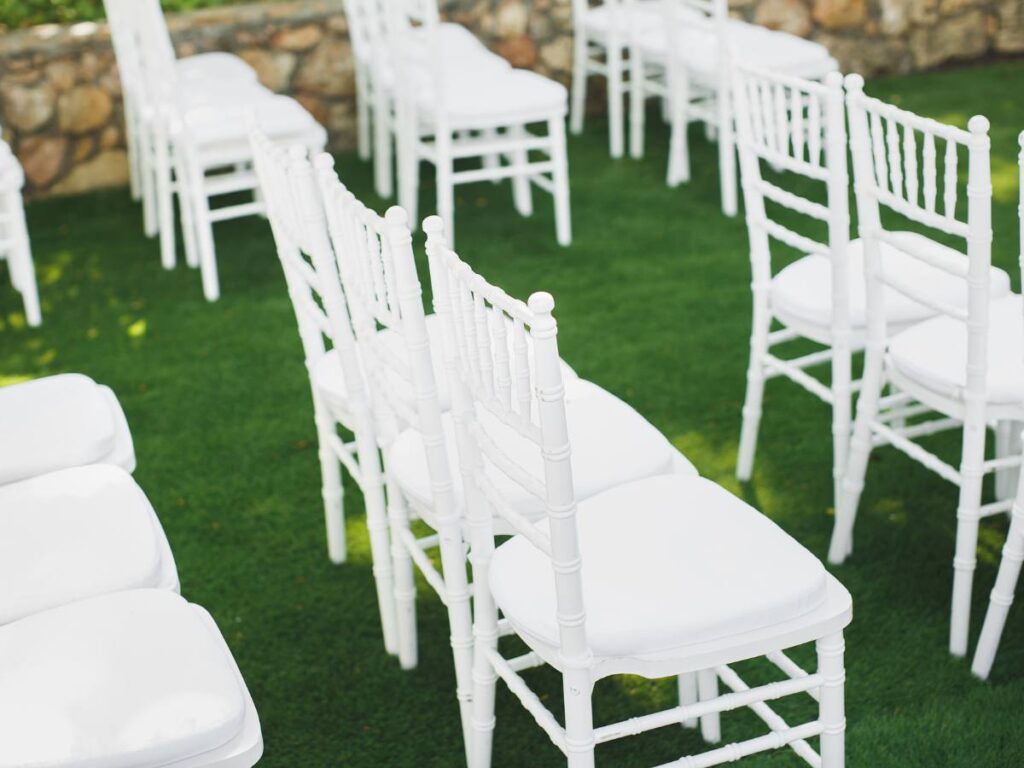
Wood Chiavari chairs are often celebrated for their timeless elegance and traditional appeal. They’ve been a staple in events like weddings, banquets, and galas for many years, offering a classic look that many find appealing. However, while they have their advantages, there are also some considerations to keep in mind.
Pros of Wood Chiavari Chairs
- Aesthetic Appeal: Wood Chiavari chairs offer a classic, elegant look that’s hard to match. Their natural finish can complement a variety of decor themes, adding a touch of sophistication to any event.
- Variety of Finishes: Wood chairs come in a range of finishes, allowing for flexibility in design and the ability to match different event aesthetics or venue decor.
- Market Demand: In certain high-end market segments, there’s a specific demand for wooden Chiavari chairs. Knowing your target audience can be crucial, as some clients, particularly in the luxury niche, might specifically request wood for its authentic charm and perceived value.
Cons of Wood Chiavari Chairs
- Durability Concerns: Wood Chiavari chairs can be prone to scratches, chips, and damage from impact, affecting their longevity, especially with frequent use or in rental scenarios. Over time, these chairs can lose strength, become wobbly, and ultimately, there is an inevitable risk of breakage.
- Maintenance and Aging: Wood chairs require regular maintenance to retain their appearance and structural integrity. Over time, they may show signs of wear, diminishing their initial charm and requiring additional upkeep or refinishing.
- Suitability: While wood chairs can be an excellent choice for venues where they are subjected to less frequent movement, they may not be the best option for rental companies due to their vulnerability to wear and the need for ongoing maintenance.
In summary, wood Chiavari chairs bring a touch of classic elegance to events but come with considerations regarding their longevity, care needs, and specific market preferences. For businesses that require durable, low-maintenance seating options, exploring other alternatives might provide more practical and cost-effective solutions. But for others, wood Chiavari chair might be totally worth it.
2. Resin Chiavari Chairs: Durable and Versatile

Resin Chiavari chairs offer a modern twist on the classic design, providing enhanced durability and versatility. They’ve become a popular choice for event rentals and venue owners alike. Let’s examine the pros and cons of opting for resin Chiavari chairs.
Pros of Resin Chiavari Chairs
- Durability: Resin chairs are known for their robustness. They resist impacts better than wood, making them less likely to chip, crack, or break, which is ideal for frequent and varied event use.
- Low Maintenance: These chairs are easier to maintain than their wooden counterparts. They don’t require frequent touch-ups or refinishing, which can be beneficial for businesses looking to minimize upkeep costs.
- Weather Resistance: Resin chairs can withstand a range of weather conditions, making them suitable for both indoor and outdoor events, adding to their versatility.
Cons of Resin Chiavari Chairs
- Weight: Resin Chiavari chairs are heavier than wood and aluminum, making them less convenient for venues or rentals that frequently move or transport chairs.
- Aesthetic Appeal: Some clients may prefer the natural look and feel of wood, especially for specific event themes or in high-end settings where the authenticity of materials is valued.
- Aesthetic Longevity: While sturdy, resin chairs can show wear over time, particularly from impacts or rough handling, as they can chip and there’s no easy way to fix these marks.
- Maintenance: While they demand less upkeep than wood, resin chairs, particularly those with screws, need regular checks and tightening to maintain their strength and prevent wear over time.
Resin Chiavari chairs offer a blend of durability and low maintenance, making them a solid choice for various event settings. While they are heavier and may lack the natural appeal of wood, their resistance to weather and lower upkeep requirements provide a practical solution. However, their appearance can deteriorate over time due to chipping, and they may require some maintenance to keep them in top condition.
3. Metal Chiavari Chairs: Strength and Style

When it comes to metal Chiavari chairs, Seat Co offers an unparalleled level of quality with our steel and aluminum options. It’s crucial to differentiate our chairs from other metal chairs in the market, which might have contributed to a misconception regarding the durability and strength of metal chairs. Let’s delve into the specifics of what makes Seat Co’s steel and aluminum Chiavari chairs stand out.
Steel Chiavari Chairs from Seat Co: Unmatched Strength
Pros of Seat Co’s Steel Chiavari Chairs
- Durability and Strength: Crafted from 100% pure steel, these chairs offer unparalleled durability. The complete welding ensures that there are no weak joints, making them incredibly sturdy and long-lasting.
- Low Maintenance: With their robust construction, Seat Co’s steel Chiavari chairs require minimal maintenance, saving time and resources in the long run.
- Stability: The weight of steel adds to the stability of the chairs, making them less likely to tip over, which is especially important in bustling event environments.
- Resistant Paint: Utilizing a powder coating process, Seat Co ensures the chairs’ finish is resistant to impacts and retains its color, maintaining a fresh look over time.
- Outstanding Longevity For Venues: For interior venues this chair could easily last for decades with basic care. The only thing that could be needed is a change of the glides, protective caps and a touch up of paint. We have a repair kit that includes all 3 things.
Cons of Seat Co’s Steel Chiavari Chairs
- Aesthetic Preferences: Despite closely resembling wooden chairs, some clients may still prefer the traditional aesthetics of wood over metal, which could influence their choice.
- Not the Best Option for Outdoors: Steel is an excellent option for venues, but for party rentals or exterior venues it’s not the best choice. The structure is very strong and will never be compromised, but although our painting process helps to protect them from rusting, we recommend that they are not exposed to humidity as they could potentially rust.
- Acoustic Factor: Metal chairs can produce a distinctive sound when moved or bumped, which might be more noticeable in quiet settings, although this is typically not a concern in lively event environments.
- Weight Considerations: Although they are not super heavy, they are heavier than wood and aluminum. They weigh about the same as resin, between 9 and 10 lbs.
Seat Co’s steel Chiavari chairs are a testament to strength and durability, with a design that’s built to last and requires minimal maintenance. While they are an excellent option for indoor venues, their suitability for outdoor use is limited due to potential rusting in humid conditions, and their weight is comparable to resin chairs, making them less ideal for frequent transportation.
Aluminum Chiavari Chairs from Seat Co: Lightweight and Versatile
Pros of Seat Co’s Aluminum Chiavari Chairs
- Lightweight Design: Aluminum chairs are notably lighter than other materials, making them easy to transport and set up, ideal for event planners and venues that frequently change layouts.
- Durability: Despite their light weight, these chairs don’t compromise on strength. Being 100% aluminum and fully welded, they offer exceptional durability and longevity.
- Minimal Maintenance: Just like their steel counterparts, aluminum chairs from Seat Co require minimal maintenance, thanks to their robust construction and quality materials.
- Weather Resistance: Aluminum is naturally resistant to rust, making these chairs a better option for outdoor events compared to steel.
- Outstanding ROI: The combination of durability, minimal maintenance, and a 7-year warranty positions Seat Co’s aluminum chairs as a top choice for achieving excellent return on investment, especially if the following cons are manageable for your situation.
Cons of Seat Co’s Aluminum Chiavari Chairs
- Initial Investment: While offering numerous benefits, aluminum chairs can be more expensive initially compared to other materials, which might be a consideration for budget-conscious buyers.
- Aesthetic Preferences: As with steel chairs, some clients might prefer the classic look of wood over metal, even though the aluminum chairs closely mimic the appearance of their wooden counterparts.
- Acoustic Considerations: Aluminum chairs can be noisier than wood or padded chairs when being moved or stacked, a minor concern that can be mitigated with careful handling.
The aluminum Chiavari chairs from Seat Co combine the benefits of lightweight design with the durability of metal, making them an excellent choice for party rentals or venues that require frequent reconfiguration. They are resistant to rust and offer significant ROI due to their longevity and minimal maintenance needs. However, the initial cost and specific aesthetic preferences might be factors to consider, along with the potential noise during movement and stacking.
Seat Co’s metal Chiavari chairs also have the great advantage that they have repleceable wearable parts. This means that if the chair top gets damaged, you could easily replace the damaged part and it will look as good as new.
4. Making Your Choice: Which Chair Suits Your Needs?

Deciding on the right Chiavari chair material for your business isn’t just about aesthetics—it’s about aligning your choice with your operational needs, budget, and client preferences. Each material offers distinct advantages and potential drawbacks, making it crucial to weigh these factors based on your specific context.
Assessing Your Business Model
Consider the nature of your business. Are you a rental company frequently transporting chairs to various venues, or are you an event venue with fixed setups? Your business model will significantly influence the ideal material choice, as durability, weight, and maintenance requirements vary between wood, resin, and metal.
Understanding Client Expectations
Knowing your clientele is essential. Align your chair selection with the preferences and expectations of your target market. This alignment ensures that your offerings resonate with what your consumers are actively seeking, enhancing satisfaction and potentially driving more business to your venue or rental service.
Budget and ROI Considerations
Evaluate your budget and consider the long-term return on investment. While wood chairs might offer immediate aesthetic appeal, the potential higher maintenance costs could affect profitability. Metal and resin chairs might have higher upfront costs but could offer better durability and lower long-term expenses.
In conclusion, choosing the right Chiavari chair material—wood, resin, or metal—should align with your business goals and client needs. Each material offers unique benefits, so consider your specific requirements to make an investment that enhances your events and adds value to your business.


